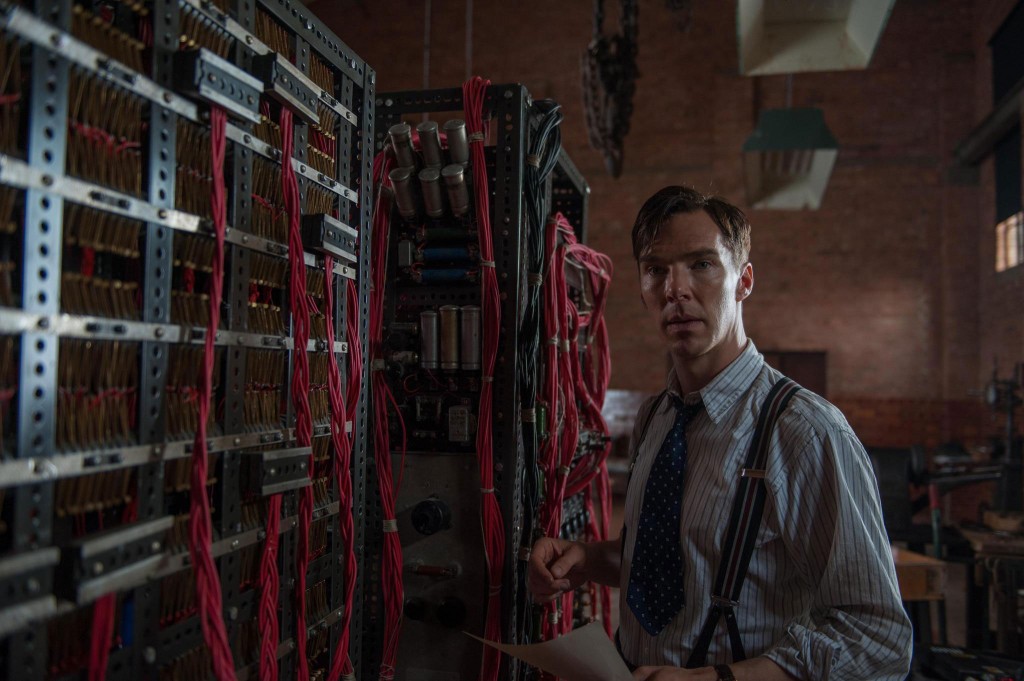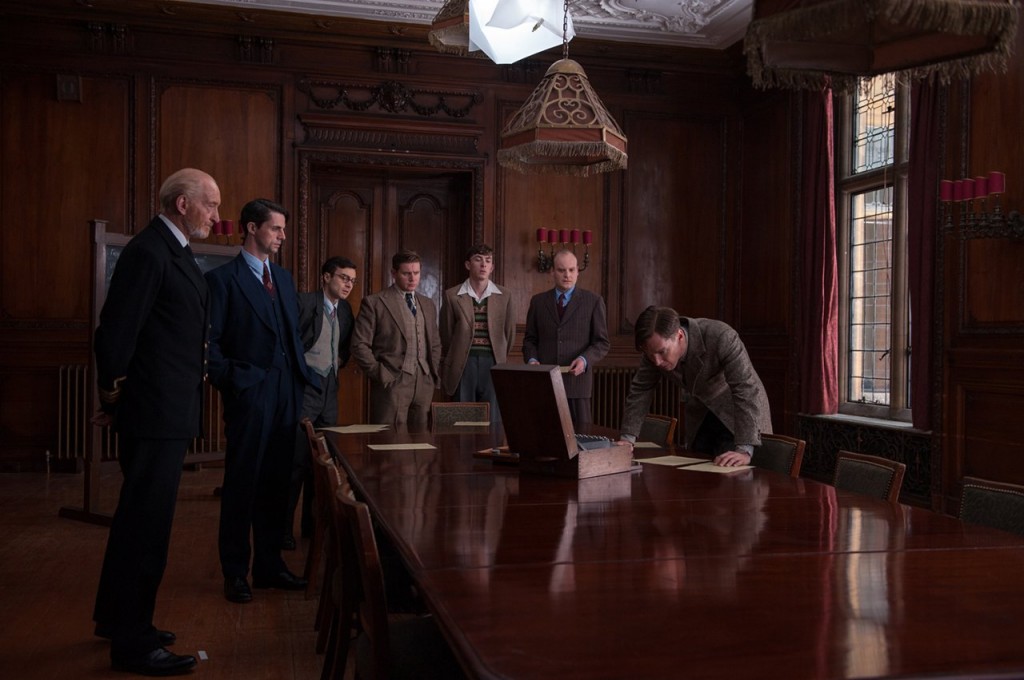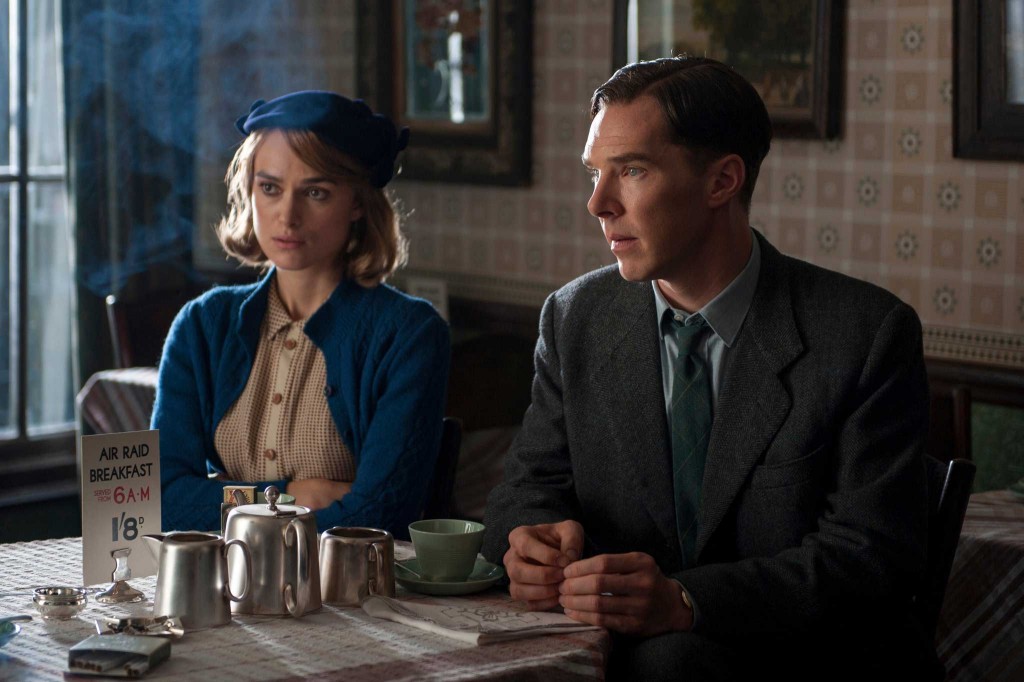There’s no shortage of films that promise to speak for the bullied, the outcasts, and/or the unusual. The Imitation Game lives up to that promise with the compelling true story of Alan Turing, a man so computer-like that he essentially invented what we call computers today.
The Imitation Game combines two of the most popular genres in film history: World War II films and tech genius films. The fact is, as much as we like to pretend otherwise, we’ll never get sick of World War II stories. It’s hard to think of too many events that have had such a global impact, and there are more worthwhile stories set during the war than can ever be put on page or screen. We’ve been getting WWII movies, books, comics, and video games since before the war itself was even over, from Audie Murphy’s To Hell And Back (based on a story so fantastic that they had to cut out actual events to make it believable) to last year’s more subtle and touching The Book Thief. The fascination with this era, both the war itself and the events affected by it, remains strong. Stories about tech geniuses, too, have long been a part of cinema. There’s something romantic about a person smarter than most can ever hope to be, and in this post-Social Network world, this type of film is now more in vogue than ever.
Turing’s contributions to computing are well known: his research kickstarted what we know as computers today. (You may have heard about the Turing test, a benchmark to determine a machine’s intelligence comparable to that of a human.) The details of his work as a military codebreaker are less famous, since his service was classified information for more than fifty years, and by the time it became public knowledge he was already long dead. At the risk of running a giant cliché, Turing was an enigma himself, and this film just about solves him.
The story follows Alan Turing (Benedict Cumberbatch), the famed British mathematician and cryptographer, as he leads a team for MI6 in cracking the German Enigma code during World War II. Joining him is an expert team of codebreakers and mathematicians, the foremost of whom is Joan Clarke (Keira Knightley), a woman with a natural talent for math comparable to Turing’s own. They must crack the German code, which changes every 24 hours, while fighting the clock and pressure from their superiors. Interspersed throughout are flashes back to Turing’s time in boarding school, and forward to his post-war life, when he is charged with indecency for homosexual acts (illegal in Britain at the time).
The central relationship of the film isn’t Turing’s unconventional friendship with Clarke, nor his prickly dealings with his superiors, Maj. General Menzies (Mark Strong) and Commander Denniston (Charles Dance), it’s his relationship with his code cracking machine. He gives it a name (Christopher, after an old friend) and is fiercely protective of it, occasionally using his body to protect it and even crying over it. You honestly get the sense that this machine is his child, and Cumberbatch sells it so well that you’ll have more sympathy for the machine than many of the humans, or at the least understand why he feels that way.
The difficulty present in any biopic or historical film is in how to maintain a sense of urgency and drama when we all know how the story ends (the Enigma code is cracked and the war ends), so the film wisely focuses on the how. Most of the film’s drama comes from two places: the race against the clock to beat the constantly changing German Enigma code, and his struggle with his superiors, who want to cancel his expensive and time consuming methods with more traditional, albeit equally unsuccessful methods.
Despite being about a complex man doing a complex project, the film is remarkably easy to follow. The plot is straightforward, the characters’ actions and motivations make sense, and you don’t even need to understand the math to appreciate his problem solving skills. (Trust me, I Pass/Failed by my cryptography class in college.)
The screenplay is decidedly witty, with some exceptionally clever banter breaking up the heavy wartime drama. Highlights include Turing’s job interview, which turns into a bit of a snark battle between him and his future commanding officer, and Turing’s awkward attempt to tell a joke to get people to like him.
The title of the film is a reference to one of Turing’s papers, but it’s not hard to assume that it might carry a few other meanings. Much of Turing’s life is a necessary form of imitation, if only for survival. To a man who thinks like a computer, everything is a puzzle. He has difficulty interacting with others, so he has to imitate certain behaviors to get his men to trust him enough to move forward. A closeted gay man during a time when homosexuality is a crime, he must imitate the behavior of heterosexuals, lest he face prison time. Joan is not immune from this, either: to help crack the code, she must pretend to be a clerical worker, lest her parents force her to come home. In order to beat the Nazis, Turing and Clarke each need to pretend to be something they’re not.
This is easily one of Cumberbatch’s best performances. He’s in nearly every scene, and never for one second is he dull. He plays a man distinctly out of touch with his peers but in touch with his era. He’s able to play logical and mathematical without ever becoming a counterfeit Spock. Don’t take my word for it: Turing’s own family said Cumberbatch was the perfect person to play Alan. Cumberbatch went to ridiculous lengths to prepare for the role, and it shows.
Knightley’s performance is spot on the whole film. She plays Joan much like the historical records indicate: personable to most, talented, and a solid foil to Turing’s rigid behavior.
A quick word about the star: Cumberbatch is a case study in how Fandom Can Be Bad while Things Are Usually Good. He’s not the most exciting actor in the world, and he may not even have a terrifically wide range (many of his characters bear striking similarities to his Sherlock Holmes), but he manages to solicit a lot of hate. In many cases he’s something of a too-safe choice (paging Doctor Strange), but much of the anger seems to be a result of this cult of worship around him. If a Thing connects with people, fans come in and lionize everything about it, including the actors, which always attracts backlash both from people who want something to hate and people who are sick of seeing news about it in their Facebook feeds every day. In general, he may not deserve all the praise he gets—largely because his fandom treats him like a god instead of an actor—but for this film, he’s at his most Cumberbatchian, and it’s never been more appropriate or perfect.
The Imitation Game is brilliantly written, excellently acted, and is a damn quick two hours. At the end of this film, I wanted to know more—Turing’s wartime activities are only a fraction of his world-changing accomplishments—but it still felt like I had absorbed a complete life story. It’s hard to think of a higher compliment for a biopic.
The Imitation Game is in theaters now.





